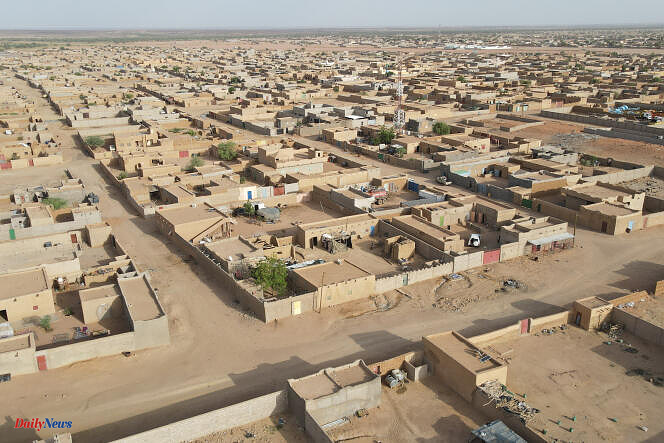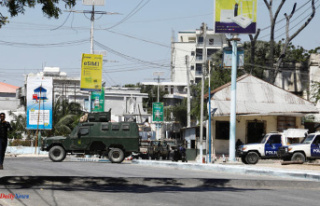After being chased, in November 2023, from their stronghold of Kidal by the regular army and Wagner's Russian mercenaries, are the rebels in northern Mali losing ground to the jihadists? In a press release dated Monday March 11 and posted on social networks, the Support Group for Islam and Muslims (GSIM), welcomed the rallying of a separatist leader, Houssein Ghoulam, presented by the subsidiary of 'Al-Qaeda in the Sahel as a "seasoned military commander" and a "man in honorable positions."
According to the Permanent Strategic Framework for Peace and Development (CSP), the body bringing together the mainly Tuareg and Arab rebel movements opposed to the Malian junta in power and against whom the latter provoked a resumption of hostilities in August 2023, Houssein Ghoulam is not really a top fighter. But the defection of the military leader of the Arab Movement of Azawad (MAA), one of the member groups of the CSP, to the camp of jihadists commanded by Malian terrorist leader Iyad Ag Ghali, raises the question: is it an isolated case or the start of a hemorrhage?
Opinions differ among rebel groups, Western diplomats and Malian security sources. The rallying of Hussein Ghoulam is certainly “a publicity stunt offered by the jihadists with the aim of showing that they are in a position of strength in the North, unlike the rebel groups who have struggled to remobilize since their defeat in Kidal », Analyzes a Malian security source, in Bamako. “The big winner in history is GSIM. Many people who left Kidal joined Iyad [Ag Ghali] to seek his protection,” says a West African security source.
Fight against the central state
In mid-November 2023, the city in northern Mali, stronghold of all Tuareg rebellions since the country's independence in 1960, was retaken without fighting by the junta and the Russian private security group Wagner. Thus sealing the defeat of the CSP after three months of clashes over the recovery of the military bases of the United Nations Mission in Mali (Minusma).
Since the end of the operation to reconquer northern Mali launched by the junta in the summer of 2023, which had broken a ceasefire maintained as best it could by the Algiers peace agreement signed in 2015 by the state and independence rebel groups, the GSIM carried out more than 290 attacks resulting in the death of nearly 530 people, according to the NGO Acled. Two thirds of them were carried out in the center and south of the country, increasingly threatening the capital, Bamako, with encirclement.
The junta no longer distinguishes between the jihadists of the GSIM and the rebels of the CSP, describing them all as terrorist allies in their fight against the central state. On March 8, the Ministry of the Economy announced in a press release that it had included on a “national list of financial sanctions” Alghabass Ag Intalla, Bilal Ag Acherif, Fahad Ag Almahoud and Achafagui Ag Bouhada, four leaders of the CSP, accused of committing “acts of terrorism.” At their side, the jihadist Iyad Ag Ghali and his most loyal lieutenant, Amadou Koufa.
At the end of November 2023, Alghabass Ag Intalla, Bilal Ag Acherif and five other rebel leaders who signed the Algiers peace agreement were prosecuted by the Bamako Court of Appeal for “association with the aim of sowing terror, carrying undermining national unity, territorial integrity and tarnishing the image of the Malian armed forces” in collaboration with the GSIM. The rebels, for their part, continue to refute any collusion with Iyad Ag Ghali's group.
“There is no longer a third way possible”
The final act of the break with Bamako was taken on January 25 by the military regime. The Minister of Territorial Administration and spokesperson for the transitional government, Lieutenant-Colonel Abdoulaye Maïga, announced in a martial tone on national television the “end with immediate effect” of the peace agreement of Algiers, following the “change in posture of certain signatory groups (…) who have become terrorist actors”. Consequence of this rupture: the interim authorities set up in northern Mali under the Algiers agreement were dismissed by the transitional government during the council of ministers of March 13.
“The military regime now considers that in the North, armed groups are either in its camp or terrorist. There is no longer a third way possible. It’s a counterproductive strategy,” laments a Western diplomat in Bamako, fearing that this “miscalculation” will push rebels into the arms of the jihadists, discouraged to see a peaceful option for resolving the conflict slipping away.
On March 12, the CSP reorganized its ranks by announcing the appointment of ten new zone commanders and their deputies in the five northern regions, namely Kidal, Gao, Timbuktu, Ménaka and Taoudéni. Does this portend a resumption of hostilities with Bamako? The CSP has been raising the threat since the Kidal debacle, without having yet implemented it.












